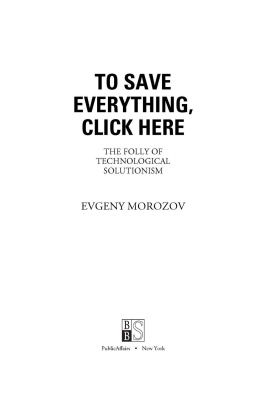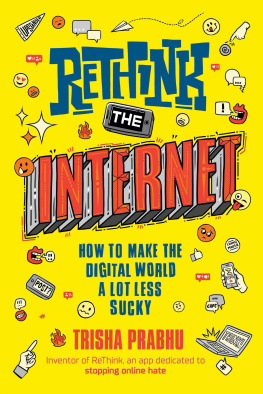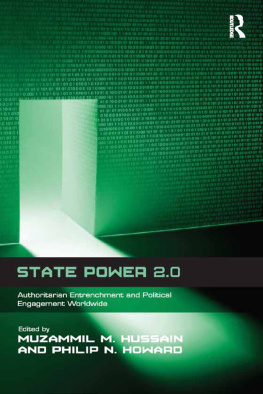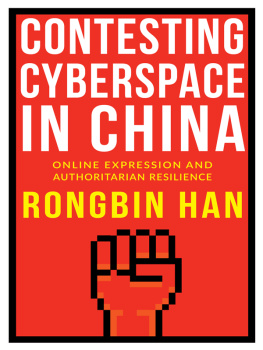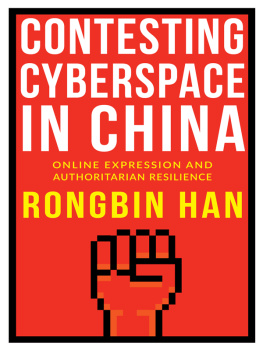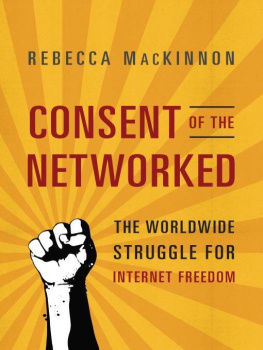ACKNOWLEDGMENTS
I wont be overstating the case if I say that this book would not have been possible without the generous supportmoral, intellectual, financialof the Open Society Foundations. I was lucky to get an OSF scholarship very early on (I was still in a Belarusian high school) that allowed me to pursue my undergraduate studies abroad. Were it not for this scholarship, I may have well ended up on the wrong side of the digital barricades.
Later, some of my work at Transitions Online was also funded by grants from OSFs Information Program. Even if some of our projects at Transitions were somewhat cyber-utopian in spirit, OSF was always the funder eager to take the most risks and take the most unconventional approaches. Thats more than an NGO can usually wish for!
After leaving Transitions, I was lucky to be invited to join the board of OSFs Information Program, which gave me a great opportunity to think about the numerous political and social implications of the Internet from a philanthropic perspective. There is hardly a better gig in the world to see just how important and political technology isand how getting it right matters.
Most important, being one of the first recipients of an Open Society fellowship, I tremendously benefited from the necessary support and flexibility to conduct much of the research for this book. A list of all my friends at the extended OSF family is too long to include here, but Id like to thank Darius Cuplinskas, Janet Haven, Stephen Hubbell, Sasha Post, Bipasha Ray, Istvan Rev, Anthony Richter, Laura Silber, Ethan Zuckerman, and especially Leonard Benardo for all their help as well as their willingness to tolerate my contrarian streak.
Between September 2009 and May 2010 I spent a wonderful academic year at Georgetown Universitys Institute for the Study for Diplomacy. This was a charming experience, not least because Charles Dolgas, Paula Newberg, and Jim Seevers helped to make it so by providing me with a superb intellectual environment to work in. Id also like to thank Tony Arendt for letting me test some of my ideas on Georgetown graduate students in my class about the Internet and democracy.
My students deserve a dedicated thanks of their own. They were a very open-minded bunch who helped to challenge my arguments in every possible way. In addition, Chanan Weissman and Tracy Huang provided me with excellent research assistance. Id also like to thank the folks at Yahoos Business and Human Rights Program, who made my stay at Georgetown possible. Ive been pleasantly surprised by their genuine dedication to intellectual inquiry into the politics of the Internet, even if that inquiry often clashed with their own interests.
Id also like to thank Joshua Cohen for first inviting me to write for Boston Review, where I published several essays about the Internet, and then for extending an invitation to spend the 2010-2011 year at Stanford. Andres Martinez and Steve Coll at the New American Foundation were also kind enough not only to award me a fellowship for the same period but to let me spend the bulk of my fellowship time at Stanford, an extremely flexible arrangement that I greatly appreciate.
Dozens of people have helped me to hone and package my ideas on stage and in the media. Of those, Id particularly like to thank the Foreign Policy teamSusan Glasser, Blake Hounshell, Joshua Keating, and Moises Naimwho gave me a chance to test my ideas both in their pages and in a dedicated technology blog. I have many other editors to thank: Ryan Sager at the Wall Street Journal, David Goodhart and James Crabtree at Prospect, and Michael Walzer at Dissent. Without their guidance and encouragement, it would have taken much longer to get my argument out into the open. The TED Conference, where I had the privilege to speak in 2009, helped to spread my ideas even further. Id like to thank Chris Anderson, June Cohen, Bruno Giussani, Logan McClure, and Tom Rielly for all their assistance on this front.
My editors at PublicAffairs, Niki Papadopoulos and Lindsay Jones, have been a true delight to work with. Id also like to thank Peter Osnos, Clive Priddle, and Susan Weinberg for taking on this project and giving me plenty of autonomy to shape its outcome. Max and John Brockman have done as superb a job as literary agents could do.
Despite the fact that they dont fully grasp what it is that I do, my family back in Belarus have all been very supportive of my intellectual quest. Even though my current vocation hardly meets their definition of a real job, my parents and my sister have shown tremendous flexibility in letting me pursue the life of the mind unburdened by the grim Belarusian reality. This book would have been impossible without their support and encouragement.
Above all, Id like to thank Aernout van Lynden, who inspired me to write, taught me how to ask challenging questions, and who, as a distinguished war correspondent, showed me what courage and decency look like. Ive had the privilege to study under Aernout as well as to discuss politics over a glass of wine with him; his influence on my own intellectual development has been immense, and it is with utmost pleasure that I dedicate this book to him.
SAN FRANCISCO,
AUGUST 30, 2010
ABOUT THE AUTHOR
Evgeny Morozov is a contributing editor to Foreign Policy and Boston Review and a Schwartz Fellow at the New American Foundation. Morozov is currently also a visiting scholar at Stanford University. He was previously a Yahoo! Fellow at the Institute for the Study of Diplomacy at Georgetown University and a fellow at the Open Society Institute in New York, where he remains on the board of the Information Program. Morozovs writings have appeared in the Economist, Newsweek, the Wall Street Journal, the International Herald Tribune, the Boston Globe, Slate, Le Monde, Frankfurter Allgemeine Zeitung, the San Francisco Chronicle, Prospect, Dissent, and many other publications. He has appeared on CNN, CBS, SkyNews, CBC, Al Jazeera International, France 24, Reuters TV, NPR, BBC Radio 4, and BBC World Service. (Photo by Alexander Krstevski)
BIBLIOGRAPHY
CHAPTER 1
Abadi, Cameron. Iran, Facebook, and the Limits of Online Activism. Foreign Policy, February 12, 2010.
Alexiou, Philip. A Twitter Moment in Politics? Voice of America, July 29, 2010.
A Look at Twitter in Iran. Sysomos Blog, June 21, 2009. blog.sysomos.com/2009/06/21/a-look-at-twitter-in-iran/ .
Ambinder, Marc. The Revolution Will Be Twittered. Marc Ambinders Politics Blog, September 15, 2009. www.theatlantic.com/politics/archive/2009/06/the-revolution-will-be-twittered/ 19376/.
Anderson, Chris. Q&A with Clay Shirky on Twitter and Iran. TED Blog. blog.ted.com/2009/06/qa_with_clay_sh.php.
Athanasiadis, Iason. Iran Uses Internet as Tool Against Protesters. Christian Science Monitor, January 4, 2010.
Bajkowski, Julian. Al Jazeera Offers Reality Check for the Twitterverse. MIS Australia.com, February 22, 2010. www.misaustralia.com/viewer.aspx?EDP: //1266801386432.
Berkeley, B. Bloggers vs. Mullahs: How the Internet Roils Iran. World Policy Journal 23, no. 1 (2006): 71.
Besporjadki V Irane Shli Po Moldavskomu ScenarijuSShA Propalilis. Evrazia.org, June 18, 2009. evrazia.org/news/8648.
Best, M. L., and K. W. Wade. The Internet and Democracy: Global Catalyst or Democratic Dud?


